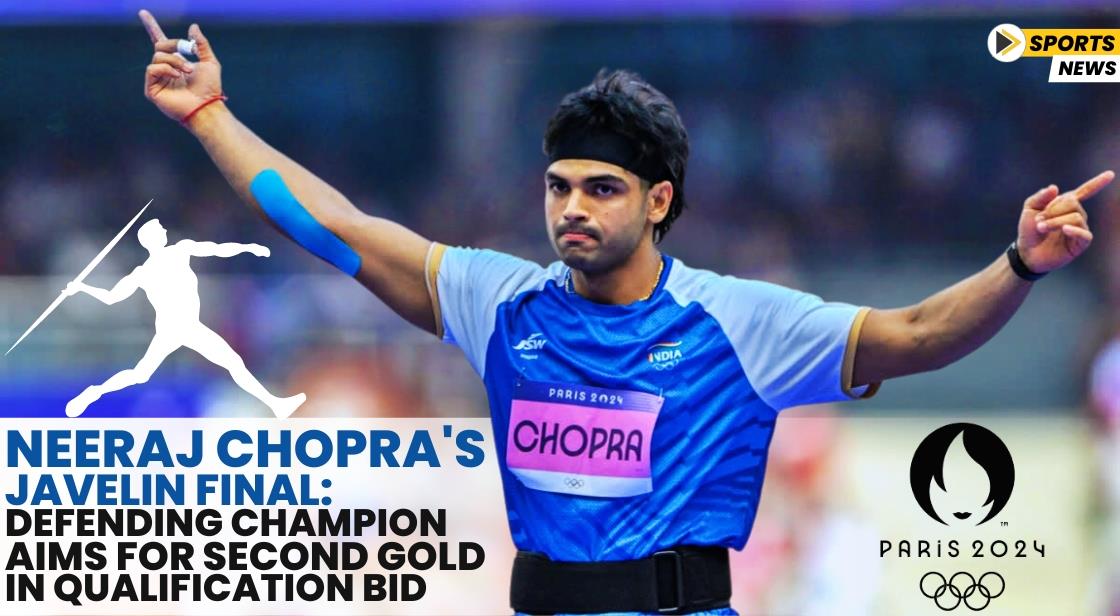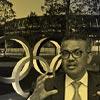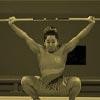Neeraj Chopra's Javelin Final: Defending Champion Aims for Second Gold in Qualification Bid

News Synopsis
Neeraj Chopra's qualification throw at the Paris Olympics 2024 has set the stage for what promises to be a thrilling final. With his career-best performance and a solid track record, Chopra is well-positioned to contend for gold once again. The presence of top javelin throwers from around the world adds to the excitement, making the final a highly anticipated event. As Chopra prepares to defend his title, all eyes will be on the August 8 final to see if he can secure a historic second Olympic gold.
Neeraj Chopra Advances to Javelin Final at Paris Olympics 2024
Qualification Highlights
Indian javelin thrower Neeraj Chopra has secured his place in the finals of the Javelin event at the Paris Olympics 2024. On August 6, Chopra marked a standout performance by achieving a throw of 89.34 meters, which is the second-best of his career. This impressive throw topped the qualification round, positioning him at the forefront of the 12-man final set to take place on August 8.
Performance Details
Chopra's throw of 89.34 meters in the qualification round was not only his best throw of the current season but also the second-highest throw of his entire career. His personal record is 89.94 meters, achieved during the Stockholm Diamond League in 2022. Prior to this, his best throw this season was 88.36 meters, recorded at the Doha Diamond League in May 2024. Chopra’s qualification throw was a significant boost, showcasing his readiness and skill as he aims to defend his Olympic gold medal from the Tokyo 2020 Games.
Kishore Jena's Performance
Alongside Chopra, Indian javelin thrower Kishore Jena was also a contender in the qualification round. Unfortunately, Jena did not advance to the finals. He finished 18th in the 32-man field, missing out on a spot in the top 12 who progressed to the final. Despite this setback, Chopra’s progress to the final is a highlight for Indian athletics.
Finals Schedule and Time
The Javelin final, where Chopra will vie for a second consecutive Olympic gold, is scheduled for August 8. The event is set to commence at 8:25 PM local time in Paris, which translates to 11:55 PM IST. The final promises to be an exciting showcase of elite javelin throwing talent.
Finalists and Competitors
The finals will feature a competitive field, including several prominent athletes. Alongside Chopra, notable competitors include:
-
Jakub Vadlejch (Czechia): A strong contender with significant experience in the javelin throw.
-
Anderson Peters (Grenada): Known for his powerful throws and past achievements.
-
Arshad Nadeem (Pakistan): Another skilled javelin thrower with a reputation for excellent performance.
-
Julian Weber (Germany): A prominent athlete in the javelin field.
The list of finalists also includes other talented throwers such as Julius Yego, Luiz Mauricio da Silva, Jakub Vadlejch, Toni Keranen, Andrian Mardare, Oliver Helander, Keshorn Walcott, and Lassi Etelatalo. Each of these athletes has demonstrated impressive skills and will be formidable opponents in the final.
Notable Absences
Max Dehning, a young and promising javelin thrower from Germany, was expected to be a strong competitor but did not advance past the qualification. Dehning’s best throw is 90.20 meters, but he could only manage 79.24 meters in the qualification round, falling short of his personal best.
Conclusion
As Neeraj Chopra gears up for the Javelin final at the Paris Olympics 2024, the anticipation is palpable. With his exceptional qualification throw of 89.34 meters, Chopra has demonstrated his top form and readiness to defend his Olympic gold medal. Scheduled for August 8, the final will see Chopra compete against a field of elite athletes, including Jakub Vadlejch, Anderson Peters, Arshad Nadeem, and Julian Weber, all of whom are formidable competitors in their own right. Despite Kishore Jena's exit from the competition and Max Dehning's surprising elimination, Chopra's presence in the final highlights his significant achievement and potential. The upcoming final promises to be a thrilling event, with Chopra's quest for a second gold medal capturing the attention of fans worldwide. As the date approaches, all eyes will be on Chopra to see if he can etch his name further into Olympic history.
Olympics History Overview
Origins and Ancient Games
The origins of the Olympic Games can be traced back to ancient Greece, where the first recorded Olympic Games were held in 776 BCE in Olympia. These games were part of a religious festival held in honor of Zeus, the king of the Greek gods. The ancient Olympics featured a range of athletic competitions, including running, wrestling, and chariot racing. Athletes from various Greek city-states competed, and victors were celebrated with olive wreaths.
Revival of the Modern Olympics
The modern Olympic Games were revived in the late 19th century, thanks to the efforts of Pierre de Coubertin, a French educator and historian. Inspired by the ancient Games, de Coubertin sought to create an international sporting event that would promote peace and cooperation among nations. The first modern Olympics were held in Athens, Greece, in 1896, with 13 nations participating in 43 events.
Growth and Global Expansion
Since their revival, the Olympics have grown significantly in size and scope. The Games have expanded to include a wide range of sports and have become a major global event watched by millions. The Olympics are held every four years, alternating between the Summer and Winter Games. The Summer Olympics have been hosted in various cities around the world, including London, Tokyo, and Sydney, while the Winter Games have been held in locations such as Grenoble, Calgary, and Sochi.
The Olympics Today
Today, the Olympics are a major international event featuring thousands of athletes competing in a broad array of sports. The Games are organized by the International Olympic Committee (IOC), which is responsible for overseeing the event and ensuring its adherence to the principles of Olympism, including promoting peace, unity, and excellence. The Olympics have also become a platform for showcasing global talent, cultural exchange, and national pride.
Significant Moments and Controversies
Throughout its history, the Olympics have witnessed many memorable moments and controversies. From Jesse Owens’ triumph in Nazi Germany during the 1936 Berlin Games to the political protests of the 1968 Mexico City Games, the Olympics have often intersected with important social and political issues. The Games continue to evolve, with recent additions such as the introduction of new sports and the inclusion of female athletes in all events, reflecting broader societal changes.
Legacy and Impact
The Olympics leave a lasting legacy in the host cities, often resulting in improved infrastructure, increased tourism, and heightened global visibility. However, the Games also face challenges, including concerns about commercialization, environmental impact, and the displacement of local communities. Despite these challenges, the Olympics remain a powerful symbol of international unity and sporting excellence.
You May Like









